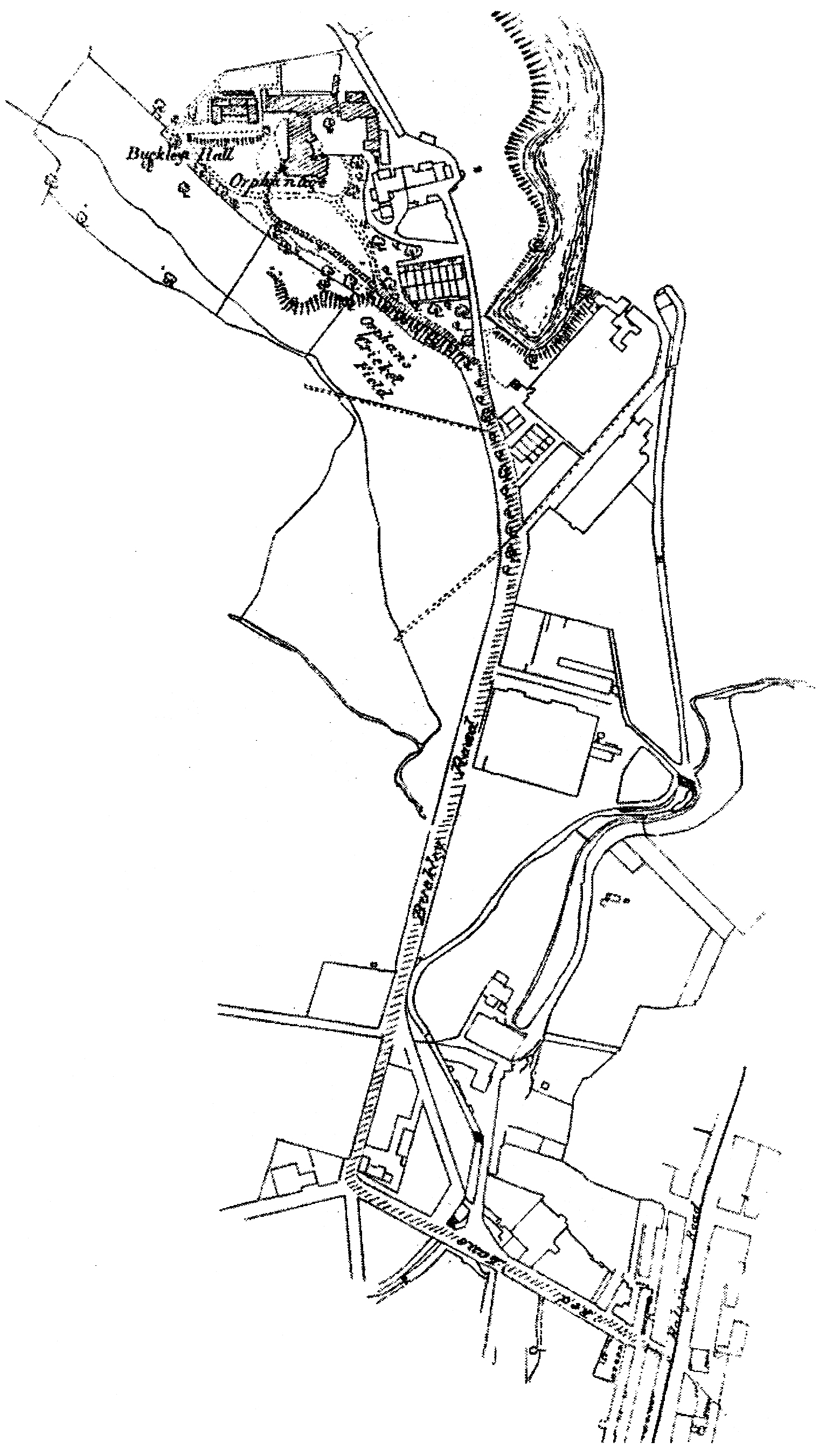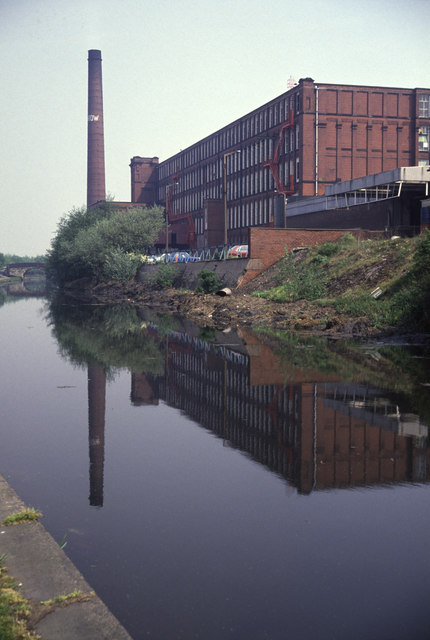|
Buckley Hall
Buckley Hall was a historic house in Buckley near Rochdale, Lancashire, England which was the home of the Buckley and later Entwistle family. The building was a Catholic boys' orphanage from 1888 to 1947, when it was demolished; Buckley Hall Prison now occupies the site. History The surname Buckley in its various spellings was first recorded in the 12th century and was supposed to have descended from a supporter of William the Conqueror. The original Hall was in existence before 1626 and was demolished in 1860, and rebuilt to "the highest standards of opulence and comfort" by William Whitworth Schofield, a local mill owner. Orphanage After the death of the owner, William Schofield, in 1882, the Hall remained unoccupied for five years. Herbert Vaughan, the Bishop of Salford, enlisted the help of the Congregation of the Brothers of Charity, an organisation already active in the welfare and education of children in Belgium and France, to initiate a similar service in the Roman Cath ... [...More Info...] [...Related Items...] OR: [Wikipedia] [Google] [Baidu] |
Historic House
A historic house generally meets several criteria before being listed by an official body as "historic." Generally the building is at least a certain age, depending on the rules for the individual list. A second factor is that the building be in recognizably the same form as when it became historic. Third is a requirement that either an event of historical importance happened at the site, or that a person of historical significance was associated with the site, or that the building itself is important for its architecture or interior. Many historic houses are also considered museums and retain permanent collections that help tell the story of their house and the era. Background Houses were first thought of as ''historic'' rather than just ''old'' or ''interesting'', during the early nineteenth century. Government protection was first given during the late nineteenth century. Historic homes are often eligible for special grant awards for preservation. What makes a historic hom ... [...More Info...] [...Related Items...] OR: [Wikipedia] [Google] [Baidu] |
Buckley, Greater Manchester
Buckley is a suburban area within the Metropolitan Borough of Rochdale, in Greater Manchester, England. It lies at the northern fringe of Rochdale, along the course of Buckley Brook, "upon an eminence of ground" by the South Pennines. It is south-southwest of the village of Wardle and north-northeast of Rochdale's town centre. Buckley spans a watercourse, a prison, farmland and residential properties. Buckley emerged as a constituent community of the manor of Hundersfield following the Anglo-Saxon settlement of Britain. Although the name Buckley is of Old English derivation, the settlement's medieval history is tied closely to a Norman family who were granted the estate as a gift for their services given in the Norman conquest of England; they subsequently adopted the surname ' de Buckley'. Members of the Buckleys of Buckley family appear throughout the High Middle Ages in legal charters related to Buckley, the surrounding area, and its manor house Buckley Hall. Throughout ... [...More Info...] [...Related Items...] OR: [Wikipedia] [Google] [Baidu] |
Rochdale
Rochdale ( ) is a large town in Greater Manchester, England, at the foothills of the South Pennines in the dale on the River Roch, northwest of Oldham and northeast of Manchester. It is the administrative centre of the Metropolitan Borough of Rochdale, which had a population of 211,699 in the 2011 census. Located within the historic boundaries of the county of Lancashire. Rochdale's recorded history begins with an entry in the Domesday Book of 1086 under "Recedham Manor". The ancient parish of Rochdale was a division of the hundred of Salford and one of the largest ecclesiastical parishes in England, comprising several townships. By 1251, Rochdale had become important enough to have been granted a Royal charter. Rochdale flourished into a centre of northern England's woollen trade, and by the early 18th century was described as being "remarkable for many wealthy merchants". Rochdale rose to prominence in the 19th century as a mill town and centre for textile manufacture ... [...More Info...] [...Related Items...] OR: [Wikipedia] [Google] [Baidu] |
Lancashire
Lancashire ( , ; abbreviated Lancs) is the name of a historic county, ceremonial county, and non-metropolitan county in North West England. The boundaries of these three areas differ significantly. The non-metropolitan county of Lancashire was created by the Local Government Act 1972. It is administered by Lancashire County Council, based in Preston, and twelve district councils. Although Lancaster is still considered the county town, Preston is the administrative centre of the non-metropolitan county. The ceremonial county has the same boundaries except that it also includes Blackpool and Blackburn with Darwen, which are unitary authorities. The historic county of Lancashire is larger and includes the cities of Manchester and Liverpool as well as the Furness and Cartmel peninsulas, but excludes Bowland area of the West Riding of Yorkshire transferred to the non-metropolitan county in 1974 History Before the county During Roman times the area was part of the Bri ... [...More Info...] [...Related Items...] OR: [Wikipedia] [Google] [Baidu] |
England
England is a country that is part of the United Kingdom. It shares land borders with Wales to its west and Scotland to its north. The Irish Sea lies northwest and the Celtic Sea to the southwest. It is separated from continental Europe by the North Sea to the east and the English Channel to the south. The country covers five-eighths of the island of Great Britain, which lies in the North Atlantic, and includes over 100 smaller islands, such as the Isles of Scilly and the Isle of Wight. The area now called England was first inhabited by modern humans during the Upper Paleolithic period, but takes its name from the Angles, a Germanic tribe deriving its name from the Anglia peninsula, who settled during the 5th and 6th centuries. England became a unified state in the 10th century and has had a significant cultural and legal impact on the wider world since the Age of Discovery, which began during the 15th century. The English language, the Anglican Church, and Engli ... [...More Info...] [...Related Items...] OR: [Wikipedia] [Google] [Baidu] |
Buckley (surname)
Buckley is a surname originating from either Ireland or England where it is particularly common, as well as Canada and the United States. Some sources outline an Irish origin, whereas others outline an Old English origin. Spelling variations of Buckley include Bucklie, Buckly, Bulkley, Buhilly, Ó Buachalla, Boughla and others. Origins The English surname is credited by some unknown sources as being of Old English origin, either as a habitation surname derived from settlements named Buckley, or as an occupational surname from the Anglo-Saxon words Bucc and Leah, meaning goat and wood. A branch of the Buckley family lived in Buckley, Greater Manchester, in Rochdale for many centuries. , rochdale.gov.uk. URL accessed February 15, 2007. They gave their name to [...More Info...] [...Related Items...] OR: [Wikipedia] [Google] [Baidu] |
Entwistle (other)
Entwistle may refer to: People * Entwistle (surname) *John Entwistle (1944–2002), English musician, bassist of The Who *Peg Entwistle (1908-1932), British stage and film actress * Entwisle, a related surname Places *Entwistle, Alberta, a small town in Alberta, Canada *Entwistle, Lancashire, a village in Turton, England **Entwistle railway station Entwistle railway station (first opened in 1848) is north of Bolton and serves the village of Entwistle. It is also the closest station to Edgworth. Unlike nearby the station lies outside the Transport for Greater Manchester boundary, meani ..., the railway station for Entwistle See also * Entwisle, a minor planet discovered in 1998 {{disambiguation, geo ... [...More Info...] [...Related Items...] OR: [Wikipedia] [Google] [Baidu] |
Buckley Hall (HM Prison)
Buckley Hall Prison is a Category C male prison in the Buckley district of Rochdale in North West England. It is operated by His Majesty's Prison and Probation Service. History Buckley Hall takes its name from Buckley Hall, a historic house which previously occupied the site. After the Second World War, the old mansion was demolished and Buckley Hall Young Offenders Institution built in its place. The site acted as a prison for young males until 1989 and after that as a venue for Prison Service Control and Restraint training. In 1994, the majority of the old prison was demolished and a new Category C prison for adult males constructed in its place. The new Buckley Hall prison was initially operated by Group 4 Prison Services, the fourth private prison to be run in the UK. However, after a tendering process in 2000 the establishment reverted to H.M. Prison Service control. In 2001, the Prison Service announced that Buckley Hall would be converted to take female inmates after in ... [...More Info...] [...Related Items...] OR: [Wikipedia] [Google] [Baidu] |
William The Conqueror
William I; ang, WillelmI (Bates ''William the Conqueror'' p. 33– 9 September 1087), usually known as William the Conqueror and sometimes William the Bastard, was the first House of Normandy, Norman List of English monarchs#House of Normandy, king of England, reigning from 1066 until his death in 1087. A descendant of Rollo, he was Duke of Normandy from 1035 onward. By 1060, following a long struggle to establish his throne, his hold on Normandy was secure. In 1066, following the death of Edward the Confessor, William invaded England, leading an army of Normans to victory over the Anglo-Saxons, Anglo-Saxon forces of Harold Godwinson at the Battle of Hastings, and suppressed subsequent English revolts in what has become known as the Norman Conquest. The rest of his life was marked by struggles to consolidate his hold over England and his continental lands, and by difficulties with his eldest son, Robert Curthose. William was the son of the unmarried Duke Robert I of Normandy ... [...More Info...] [...Related Items...] OR: [Wikipedia] [Google] [Baidu] |
Herbert Vaughan
Herbert Alfred Henry Vaughan, MHM (15 April 1832 – 19 June 1903) was an English prelate of the Catholic Church. He served as Archbishop of Westminster from 1892 until his death in 1903, and was elevated to the cardinalate in 1893. He was the founder in 1866 of St Joseph's Foreign Missionary Society, known best as the Mill Hill Missionaries. He also founded the Catholic Truth Society and St. Bede's College, Manchester. As Archbishop of Westminster, he led the capital campaign and construction of Westminster Cathedral. In 1871 Vaughan sent a group of Mill Hill priests to the United States to minister to freedmen. In 1893, the American branch of the society spun off, with Vaughan's permission, to form the Society of St Joseph of the Sacred Heart, whose members are known as Josephites. Early life and education Herbert Vaughan was born at Gloucester, the eldest son of Lieutenant-Colonel John Francis Vaughan, of an old ''recusant'' (Catholic) family, the Vaughans of Courtfiel ... [...More Info...] [...Related Items...] OR: [Wikipedia] [Google] [Baidu] |
Bishop Of Salford
The Bishop of Salford is the Ordinary of the Roman Catholic Diocese of Salford in the Province of Liverpool, England. With the gradual abolition of the legal restrictions on the activities of Catholics in England and Wales in the early 19th century, Rome decided to proceed to bridge the gap of the centuries from Queen Elizabeth I by instituting Catholic dioceses on the regular historical pattern. On 29 September 1850, Pope Pius IX issued the Bull ''Universalis Ecclesiae'' which created thirteen new dioceses which did not formally claim any continuity with the pre-Elizabethan English dioceses of which one of these was the diocese of Salford and went on to take up the reins of part of the former Vicariate Apostolic of the Lancashire District. In the early period from 1850 the diocese was a suffragan of the Metropolitan See of Westminster, but a further development was its assignment under Pope Pius X, on 28 October 1911, to a newly created Province of Liverpool. At the diocese's ... [...More Info...] [...Related Items...] OR: [Wikipedia] [Google] [Baidu] |
Brothers Of Charity
The Brothers of Charity are an international religious institute of Religious Brothers and associate members at the service of the people most in need in the field of education and health care. The institute was founded in 1807 by Peter Joseph Triest in Ghent, Belgium. He also founded three other religious congregations inspired by Vincentian spirituality. The congregation's patron saint is St. Vincent de Paul. Today the Brothers maintain a presence in 30 countries. History The first work of the Brothers of Charity was caring for elderly men at Byloke. In 1809, Brother Jan Porter of the Byloke hospice, started to teach the alphabet to some street urchins at the gate. The first school was established in 1814. In 1815 the brothers began to tend to patients with mental illness that had been confined and restrained in the cellar of the Gerard-the-Devil castle. The name "Brothers of Charity" was given to the Brothers by the people of Ghent where they first served amongst the poor a ... [...More Info...] [...Related Items...] OR: [Wikipedia] [Google] [Baidu] |





